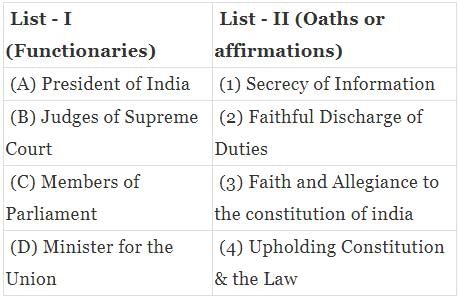Indian Polity - BPSC (Bihar) MCQ
20 Questions MCQ Test Indian Polity for State PSC Exams - Indian Polity
In which one of the following countries, will the no-confidence motion to bring down the government passed by the legislature be valid only when the legislature is able to find simultaneously a majority to elect successor government?
Through the 73rd Constitutional Amendment Act, 1/3 of seats for women are reserved in the Panchayats under which Article?
| 1 Crore+ students have signed up on EduRev. Have you? Download the App |
Which one of the following States of India has passed a legislation (in 1996) making the maintenance of one's parent mandatory?
If the Prime Minister of India belonged to the Upper House of Parliament:
Consider the following statements:
Assertion (A): The reservation of thirty-three percent of seats for women in Parliament and State Legislature does not require Constitutional Amendment.
Reason (R): Political parties contesting elections can allocate thirty-three per cent of seats they contest to women candidates without any Constitutional Amendment.
Q. In the context of the above two statements, which one of the following is correct?
Which of the following are/is stated in the Constitution of India?
1. The President shall not be a member of either House of Parliament.
2. The Parliament shall consist of the President and two Houses.
MatchList-I with List-II and select the correct answer using the codes given below the lists:

In which one of the following countries are 75 percent of seats in both Houses of Parliament filled on the basis of first-past the post system and 25 per cent on the basis of Proportional Representation system of elections?
In the following quotation: "WE THE PEOPLE OF INDIA having solemnly resolved to constitute India into a Sovereign, Socialist, Secular, Democratic Republic and to secure to all its citizens JUSTICE, social, economic and political; LIBERTY of thought, expression, belief faith and worship; EQUALITY of status and of opportunity; and to promote among them all; FRATERNITY assuring the dignity of the individual and the unity and the integrity of the Nation; In our Constituent Assembly that 'X' do hereby adopt, enact and give to ourselves this Constitution",
`X' stands for:
Given below are two statements, one labelled as Assertion (A) and the other labelled as Reason (R).
Assertion (A): Willful disobedience or non-compliance of Court orders and use of derogatory language about judicial behaviour amounts to Contempt of Court.
Reason (R): Judicial activism cannot be practised without arming the judiciary with punitive powers to punish contemptuous behaviour.
Q. In the context of the above two statements, which one of the following is correct?
Which one of the following schedules of the Constitution of India contains provisions regarding anti-defection Act?
The Indian parliamentary system is different from the British parliamentary system in that India has
Consider the following statements:
An amendment to the Constitution of India can be initiated by the:
1. Lok Sabha
2. Rajya Sabha
3. State Legislatures
4. President
Which of the above statements is/are correct?
Consider the following statements regarding the National Human Rights Commission of India:
1. Its Chairman must be a retired Chief Justice of India.
2. It has formations in each state as State Human Rights Commission.
3. Its powers are only recommendatory in nature.
4. It is mandatory to appoint a woman as a member of the Commission.
Q. Which of the above statements are correct?
|
149 videos|514 docs|208 tests
|
|
149 videos|514 docs|208 tests
|

















